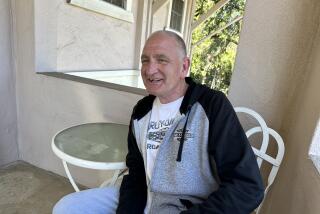Court Official to Join Drug Program, Avoiding a Trial
- Share via
SANTA ANA — Robert K. Tuller Jr., who resigned as a court commissioner in Fullerton after he was caught with cocaine, won the chance Friday to avoid prosecution if he completes a rehabilitation program.
Municipal Court Judge Gary P. Ryan permitted Tuller to join a program in which first-time drug offenders have charges against them dismissed once they finish a court-ordered recovery program.
During a brief court appearance by Tuller, Ryan told him that the one felony count of cocaine possession will be dismissed Feb. 8--as long as Tuller continues his once-a-week group therapy sessions at Fullerton’s St. Jude Hospital and Rehabilitation Center and attends three sessions per week of Narcotics Anonymous.
Tuller, wearing a tie clip bearing a tiny figure of the scales of justice, declined to speak with reporters after the hearing. But his attorney, Lloyd L. Freeberg Jr., said Tuller believes that his arrest and subsequent enrollment in therapy, however painful, has made him “a better person in the long run.”
Tuller, 46, was arrested May 11 in an Anaheim hotel room after buying $100 in cocaine from a police informant. The informant had told police earlier that he had used cocaine with Tuller many times during the last 10 years.
Days after his arrest, Tuller enrolled in a drug rehabilitation program at the Betty Ford Center in Rancho Mirage. Soon after his release, he resigned from his job as commissioner of Municipal Court in Fullerton, a post to which the judges of that court appointed him in 1986. His colleagues said they never had a hint that he was a drug abuser.
Friday, Deputy Dist. Atty. Carl W. Armbrust argued against allowing Tuller into the so-called “diversion” program, saying that although Tuller meets the legal requirements, he is not a suitable candidate.
“It doesn’t seem reasonable that a person who has graduated from snorting to freebasing is the type of person who should be allowed into the diversion program,” Armbrust said.
The prosecutor said Tuller had told the Probation Department that he had used cocaine just four or five times in the last year--but that Tuller told police after his arrest that he had used the drug three times a month.
Armbrust also noted a statement by Tuller in the police report in which he said he “got help once” for his drug problem but “went back to using again.”
That statement is a misquote, said Freeberg, who also said Tuller had never been in any other recovery program.
What Tuller told the police was that he had tried to solve his drug problem on his own and had failed, his attorney said.
After the hearing, Armbrust said he is disappointed that Tuller was permitted into the diversion program, because he said Tuller ought to be prosecuted, at least in part because of the position of public trust that he held.
“I feel that attorneys and judges should be held to a higher standard than others,” the prosecutor said.
Tuller is scheduled to return to court Feb. 8 for a determination on whether the charge will be dismissed.
More to Read
Sign up for Essential California
The most important California stories and recommendations in your inbox every morning.
You may occasionally receive promotional content from the Los Angeles Times.











